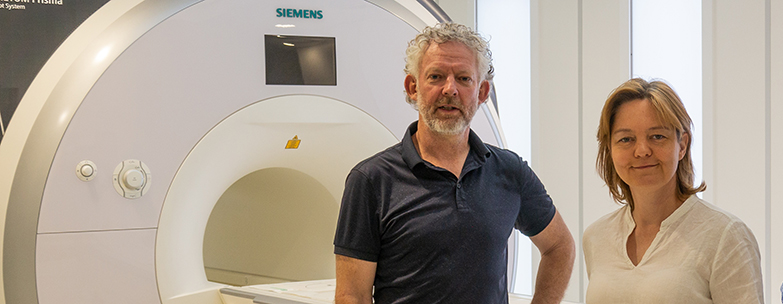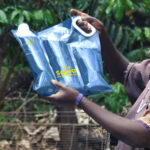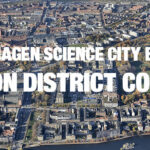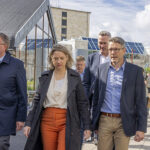Hospital innovation in Copenhagen Science City ensures more human contact
Hospital staff create value when they spend time face-to-face with patients, not glued to screens. That is a central mantra for the Innovation Centre at Copenhagen university hospital Rigshospitalet. Now in its third year the centre has grown to a staff of 20. It recently moved to inviting surroundings in the innovation district Copenhagen Science City. By Jes Andersen.
Solutions should have value for patients and staff
A central aim for the centre is to transform innovation from something that happens at the centre, to something that is rooted in the hospitals’ DNA. To this end CIO Henning Langberg is establishing a series of micro-centres close to the hospitals’ clinics. Here hospital staff has easy access to six different programmes and day to day interaction with the centres’ business developers and innovation experts. Being embedded with the clinics is vital for the centre, says Langberg.
Innovation is only valuable, if the patients and the staff that care for them can see the value in it. We should always focus our efforts where there is a real need for solutions”: Henning Langberg, Chief Innovation Officer, Innovation Centre Rigshospitalet.
Challenges, inspiration and free time
All staff at Rigshospitalet are highly qualified and highly specialized but not many are familiar with the peculiar demands of innovation and commercialisation. Neurosurgeon Louise Møller Jørgensen wanted to solve a highly specialised problem. Creating images of the brain in an MR-scanner while stimulating it electrically was impossible because of electrical interference. Together with two co-inventors, she is commercialising a patented device solving this problem.
The innovation centre asked the critical questions we needed to move forward and inspired us by facilitating workshops with successful entrepreneurs and businesspeople. Most importantly, they also secured me the free time from clinical duties to pursue this idea. Getting leadership backing for this task has been truly valuable”. Louise Møller Jørgensen, Specialist in Neurosurgery, University hospital Rigshospitalet, Glostrup.
Partnerships with commercial actors
The innovation staff also help by removing organisational, legal, and technical barriers and not least, by facilitating partnerships with commercial actors. This makes the centre a significant value proposition for Copenhagen Science City.
We strive to make our district one of the best places in Europe to launch or scale an innovation-based business. We salute our partner Rigshospitalet for making it easier for commercial actors to meet inventors and to co-create solutions that make a difference for patients”: Kristoffer Klebak, Head of Secretariat, Copenhagen Science City
Pitch ideas or solutions
Rigshospitalet invites established companies to co-create new solutions to specific challenges or demands experienced at the hospital. In addition, start-up, scale-up or corporate companies are invited to pitch their idea or solution to the hospital by filling out a simple form at the Rigshospitalet website. Staff at the Centre will then review whether the idea matches a need. If it does, they will find a suitable clinic for testing as well as a suitable clinical partner for co-developing the solution. All within 14 days.
We see time and time again, that a healthcare solution from a company does not fit when it enters the hospital. This might be due to simple technical issues or lack of insights on how procedures are run at the hospital. With our “Pitch and Match”-tool we hope to catch any preventable mistakes before they become costly- or even impossible- to fix. We instead invite for co-creation of solutions”: Henning Langberg, CIO, Innovation Centre Rigshospitalet.
Valuable lessons about innovation ecosystem
As welcome as companies are, doctors and nurses working in clinical settings usually define the challenges that need solving. Staff are invited to join incubator programmes, where they learn business competences and are encouraged to keep focus. They get access to funding through programmes such as Beta|Health and they are paired with companies at matchmaking events every six months. According to Langberg, they also learn something they could only learn in Copenhagen Science City.
We teach them to use the innovation ecosystem. Within our innovation district, we have access to unique instruments and facilities for testing, characterisation, and validation – as well as to university researchers, and their more than 20,000 students. We also have several start-up communities. All within easy walking distance of our own clinics”: Henning Langberg, CIO, Innovation Centre Rigshospitalet.
Taking the leap into innovation
With this many-pronged approach, Langberg and the Rigshospitalet management hope to automate more tasks in the future to allow clinical personnel to focus on helping the ever-increasing number of patients admitted to the hospital. Louise Møller Jørgensen is satisfied that commercialising her invention will allow specialists like herself to help patients with Parkinson’s, chronic pain and other brain-related issues and she has this to say to other clinicians who might take the leap into innovation.
You will probably want to continue working in the clinic, so you must learn to give up control of your invention at the right time. Commercialising your idea takes a lot more than proof of concept and clinical trials, but it is a powerful way to make it useful”: Louise Møller Jørgensen, Specialist in Neurosurgery, University hospital Rigshospitalet, Glostrup.
An innovation district in the heart of Copenhagen
Copenhagen Science City is a two square kilometre innovation district in the heart of the Danish capital. Here, University of Copenhagen, University Hospital Rigshospitalet and University College Copenhagen are working to create optimal conditions for students and researchers dreaming of starting a business, and for companies who need to develop, validate or test their products in collaboration with the knowledge institutions.




